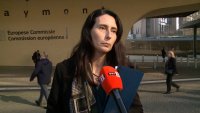
More and more Bulgarians living abroad are looking back toward their homeland. A new programme by the Ministry of Social Policy offers financial support and a fresh start in Bulgaria. But is that enough to make them return?
Marina Pavlova left Varna eight years ago. She moved with her family to Cologne, where she now works as a nurse in the neurology department of the local university hospital. She says Germany is well-organised and peaceful, but she misses Bulgaria.

Marina Pavlova – Nurse at University Hospital Cologne:
“Especially after a holiday in Varna, by the end of the vacation I always feel like one foot is in Bulgaria and the other is here. It’s not exactly homesickness, this nostalgia. When I return to Bulgaria, my blood, my DNA vibrates to a different music, a different tone that cannot reach me here. This is not my concert.”
Over 800,000 Bulgarians live abroad just within the European Union. Now, a new initiative from the Ministry of Social Policy — called “I Choose Bulgaria” — offers them a chance to return permanently. It will also support citizens already living in Bulgaria who want to relocate to smaller towns and villages.
Natalia Efremova – Deputy Minister of Labour and Social Policy:
“This programme addresses the problem of population decline in Bulgaria as a pilot project, which is part of a wider set of measures in demographic policy.”

The programme has a total budget of BGN 66.5 million, most of which comes from European funds. Up to 870 emigrants like Marina, who want to move and work in Bulgaria, can receive a one-time financial aid of between BGN 5,000 and 10,000. Additional incentives are offered for rent, transport, employment, and Bulgarian language training.
Natalia Efremova - Deputy Minister of Labour and Social Policy:
“Our key partners will be the Employment Agency, as they will assist all applicants in finding jobs, guide them towards various programmes and measures we finance, or directly facilitate connections with employers.”Marina Pavlova - nurse at University Hospital Cologne:
“Certainly, such a programme will act as a magnet for many people considering returning to Bulgaria. At the moment, there is a significant wave of returnees who are buying small houses in villages or renovating apartments they already own. So why not?”
After many years in Japan, Tsveta Panayotova also recently returned home. However, in an analysis for the Institute for Market Economics, she remains sceptical about the ministry’s strategy. She believes it would be more effective if it included tax incentives, following examples from other European countries.
Tsveta Panayotova - Institute for Market Economics:
“Having such a programme is perhaps a step in the right direction, but it’s not the solution. It won’t make young people return; it will simply fund those who have already decided to come back.”
According to her, the programme will at best meet less than 1% of the labour market’s needs.

Tsveta Panayotova - Institute for Market Economics:“Even if we bring back 800 people, and some of them are highly qualified, the added value will still not be as significant as expected from such a programme.”
The ministry insists the investment in every specialist is worthwhile. They have already received enquiries, and from September, applications will be accepted via the Employment Agency’s website. Marina may well be one of the applicants.
Marina Pavlova - a nurse at the University Hospital Cologne: “We have been lied to enough. At times, we felt despair. We’ve been disappointed enough. But Bulgaria is small. Things can actually fall into place very quickly. And the most interesting thing is that despite all the injustices, roses keep blooming constantly.”
For her, money is not the most important factor — it’s comprehensive reforms, especially in the healthcare system where she works. Still, she believes that sometimes small steps lead to big changes.
 Economy Minister Orders On-Site Checks at Electricity Suppliers Following Surge in Complaints
Economy Minister Orders On-Site Checks at Electricity Suppliers Following Surge in Complaints
 Sunken Fishing Vessel off Sozopol Shows No Breaches or Holes in the Hull, Navy Chief Says
Sunken Fishing Vessel off Sozopol Shows No Breaches or Holes in the Hull, Navy Chief Says
 Депутатите отложиха въвеждането на мултифондовете в пенсионната система
Депутатите отложиха въвеждането на мултифондовете в пенсионната система
 Казусът с българския европрокурор: Какви са обвиненията срещу Теодора Георгиева?
Казусът с българския европрокурор: Какви са обвиненията срещу Теодора Георгиева?
 България не е усвоила нито едно от 600 000 000 евро от фонда за справедлив преход, заяви служебният регионален министър
България не е усвоила нито едно от 600 000 000 евро от фонда за справедлив преход, заяви служебният регионален министър